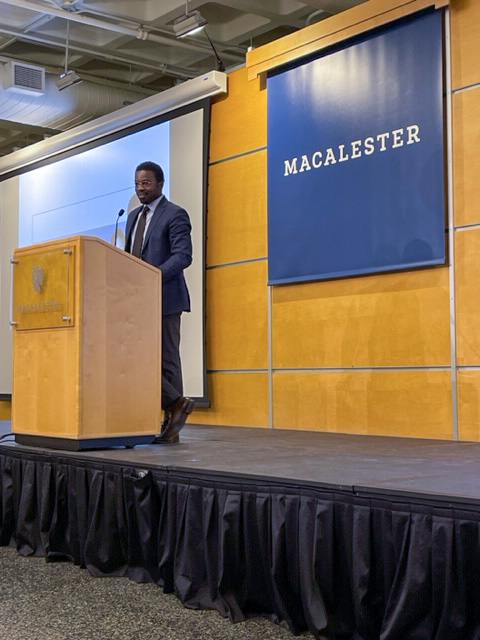Chemistry distinguished lecture: Mac alum Richmond Sarpong ’95
February 16, 2023
On Feb. 7, 2023, students filled Kagin Ballroom to listen to the Jean Dreyfus Public Lecture by Macalester alumnus Professor Richmond Sarpong ’95. Professor Sarpong currently teaches at the University of California, Berkeley and has been recognized both nationally and internationally for his contributions to the field of organic chemistry.
Sarpong began his lecture by describing his background. He was born and raised in Ghana and spent some of his childhood in Zambia before going to high school in Botswana.
“One of the reasons we moved to Botswana was because my father was an epidemiologist and was responsible for part of the education program to combat HIV/AIDS which was spreading rapidly in the country at that time,” Sarpong said. “Most of my childhood was spent hearing about disease.”
His interest in chemistry stems from experiencing the response to River Blindness in Ghana.
“What actually made the largest, most indelible impression on me was this disease called onchocerciasis… [which] came to be called River Blindness,” Sarpong said. “It wasn’t necessarily the disease that made an impression on me. It was actually the world’s response to this disease.”
Through a collaboration between labs in the U.S. and Japan, a compound was derived from a natural product that could rid people of the parasite which causes blindness.
“When I saw the effectiveness of this compound in Africa, I became super excited [about the] difference that one could make in the lives of people if you were to study this subject of organic chemistry,” Sarpong said. “As an organic chemist, maybe there’s an opportunity to make a difference in the lives of hundreds of thousands of people if you were able to come up with a compound that then would become a medicine.”
This experience sparked his interest in organic chemistry, which he decided to pursue in his chemistry studies at Macalester, Princeton and CalTech. He talked about his undergraduate advisor at Macalester, Professor Hoye, sharing what she taught him during his time here.
“The lesson that I took away from my time at Macalester was really this: you have a diversity of people and opinions in the world and that is a strength because it enables you to look at the world from different perspectives,” Sarpong said. “She taught me to believe, not only in myself but also in the people I ultimately would work with, because it was through this belief in others that perhaps you could help them believe even more in themselves.”
Sarpong began to dive into his research, explaining that natural products are the foundations for many medicines. Chemists are tasked with identifying these products, figuring out what purpose they can serve and then replicating them sustainably.
“The process of designing the strategy for building a new type of molecule and also fashioning the tools you’re going to use to implement that strategy,” Sarpong said. “That is the process of advancing the science of synthesis and ultimately that might guide the way in which you make new medicines or even new materials.”
During these processes, things don’t always go as planned. However, Sarpong does not view these moments as failures.
“Sometimes accidents happen and when accidents happen, you can actually discover something unintended which can inspire a new way of thinking,” Sarpong said.
He talked about the natural product that is used to treat malaria, something he worked on in his lab that reduced the cost of treatment immensely. He also explained how compounds impact pain receptors in the human body. The manipulation of compounds found naturally in the world can be used to combat disease, pain and cancer.
In this incredibly accessible lecture, Sarpong managed to explain what organic chemists do and why their work is important. Chemistry is the basis for understanding how our world functions, and organic chemists are working to find molecular solutions to massive global problems.













